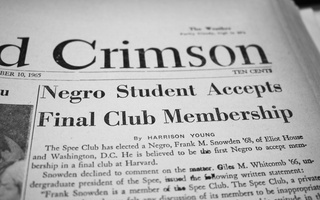UPDATED: March 9, 2017 at 2:52 p.m.
After announcing plans to go gender neutral last fall, the formerly all-female Sablière Society—now rebranded as the Sab Club—inducted a group of 14 men into their ranks this weekend, according to undergraduate president Lulu S. Chua-Rubenfeld ’18.
The new members were accepted following an abbreviated “punch,” a final club-specific term for the membership selection process. Chua-Rubenfeld said the club, which does not traditionally conduct a spring punch, decided to admit a number of men ahead of next fall’s open punch so that the new members could advise the club’s transition to a fully gender-neutral club.
“We wanted to do this in a way that would make incoming members next fall most welcome,” Chua-Rubenfeld said. “Without mentioning other clubs or anything, we didn’t want it to be a situation where we were punching boys just as a room full of women, with no male advisory members and no male current members.”
The club has also changed its name, logo, and club color in an effort to reflect the new gender neutral composition of its membership.
“The Sablière was originally named after a female French figure,” Chua-Rubenfeld said. “We decided that along with the logo, which was a swan, and the color, which was a light blue, we just wanted to do some rebranding so that it’d match our transition into gender neutral [membership].”
The Sab’s decision comes more than a year after the formerly all-male Spee Club elected its first group of both men and women in November 2015, officially becoming a gender neutral club. The Spee did not add women to their membership before conducting a gender-neutral punch.
Undergraduate members of the all-male Fox Club also accepted a group of junior and senior women into its membership six weeks after the Spee, though a subsequent vote among the club’s graduate members barred undergraduates from extending membership to future classes of women.
In the case of the Fox, undergraduate leaders cited pressure from administrators for the decision, writing that Harvard had “forced [their] hand.” Since then, the College has announced sanctions against single-gender final clubs and Greek organizations that, starting with the Class of 2021, will bar students involved in those groups from leadership positions and College endorsement for certain prestigious fellowships. A faculty committee is reconsidering those penalties.
In announcing the change last fall, then-president of the Sab Reva Nohria ’17 said that while the administrative pressure had some influence, the decision came primarily from the club’s members. On Friday, Chua-Rubenfeld echoed that sentiment.
“Our club made this vote before the sanctions came out, because it was something that we thought was important,” she said. “The original reasoning was that in so many times throughout Harvard’s history, it’s been the men who have been opening up their spaces to women—even in the case of Harvard and Radcliffe.”
“We think it’s really empowering to be a women’s space opening up our organization to non-women,” she added.
Newly-inducted members of the club said they approved of the club’s move to gender neutrality.
“We are kind of getting out of this gendered idea and breaking out of this idea, because when the male-female barrier breaks down we kind of get into who you are as a person, as opposed to your gender and how you’re expected to perform as a male-identifying person or female-identifying person,” new Sab Club member Tynan Jackson ’19 said.
Matthew Moore ’19, another new Sab Club member, said he saw membership as “a great opportunity for redefining the social scene in a way that isn’t dominated by just males.”
“This hopefully sends a message that there can be situations where men and women and even those who don’t identify as men or women can have an equal share in Harvard’s social scene,” Moore said.
In response to news of the Sab going gender neutral, Dean of the College Rakesh Khurana repeated his oft-cited thoughts on creating “an inclusive and belonging culture.”
“Harvard College is committed to having a nondiscriminatory experience for all of our students,” Khurana said. “I think this is something that our community does together. I think creating that experience as a baseline of being nondiscriminatory, and then on top of that being an inclusive and belonging culture—it’s on all of us.”
Chua-Rubenfeld also spoke of the Sab’s commitment to “what it means to be inclusive on campus,” citing their financial aid program.
“We’re really trying to move first on the inclusivity front,” she said.
—Staff writer Derek G. Xiao can be reached at derek.xiao@thecrimson.com. Follow him on Twitter @derekgxiao.
This article and a previously associated photo have been revised to reflect the following correction:
CORRECTION: March 9, 2017
A previous version of this article incorrectly indicated that the Sab Club would be hosting social events at 60 Ellery St. In fact, the Sab Club will not be hosting events at an apartment there.
Read more in News
Proposal Would Restructure FAS Course Day, End Harvard TimeRecommended Articles
-
Dismantle Final Clubs NowOur concern is this: the clubs’ elite membership go on to run the world in the image of how they understand it–through the narrow lens of exclusion.
-
 A.D. Club to Host ‘Open’ Punch Process, Mandate Sexual Assault Training
A.D. Club to Host ‘Open’ Punch Process, Mandate Sexual Assault Training -
 April 15 Final Club Deadline Passes With Little Activity
April 15 Final Club Deadline Passes With Little Activity -
 Integrating Prep Schools and Punch Season: Frank M. Snowden ’68
Integrating Prep Schools and Punch Season: Frank M. Snowden ’68 -
 Coping with Co-Ed
Coping with Co-Ed













